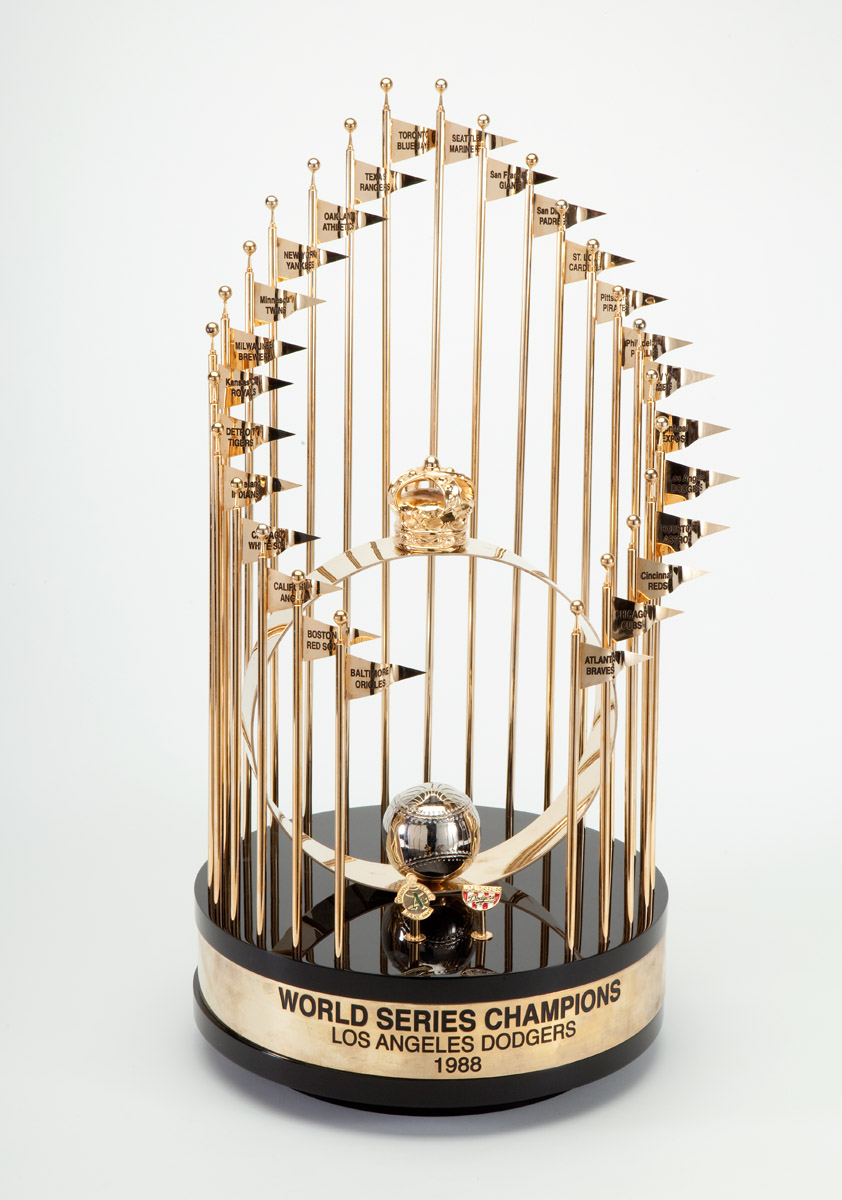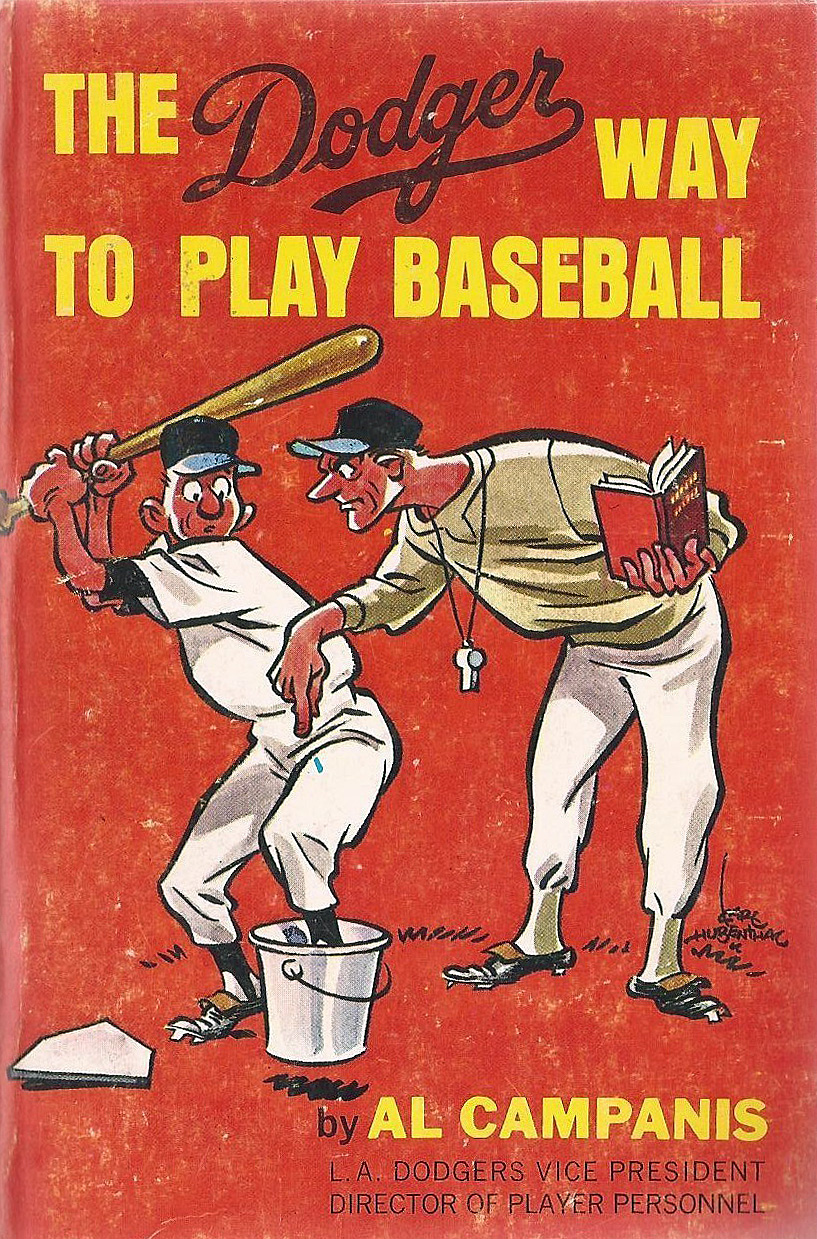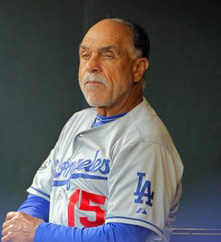For forty years, four decades, there were three certainties in life: death, taxes and the Dodgers making it to the World Series two or three times in each of those decades. You just knew that you wouldn’t have to wait many years for another appearance in the big show. Then, along came the nineties and things changed. Death, with its ever present reminder became more of a certainty, taxes remained on board for the long haul with an even stronger presence, but the third certainty, the Dodgers competing in the World Series, jumped ship and disappeared totally, leaving only the passengers, the fans, on board. Next year, 2013, will make it a quarter of a century since we last appeared in the fall classic.
So what happened? I expect there are various theories, all the way from greed, to free agency, to ownership issues, and more. I don’t pretend to know what the actual causes of the decline and fall of the Dodger Empire really are. I just know what seems to have changed. Those changes may be causal or merely coincidental. To me, the knockout punch came when the Dodger Way suffered what seems to be irreparable damage. Again, I don’t pretend to know all about the Dodger Way, just what I have observed as different.
Branch Rickey’s disciple, Al Campanis wrote a book in 1954, “The Dodger Way to Play Baseball”. It became the Dodger bible for four decades as its tenets became part of the Dodgers throughout the farm system, which other major league teams tried to emulate but without the success experienced by the Dodgers. Campanis, in his book, preached pride in coaching and fundamentals with an emphasis on pitching, speed and defense. Peter O’Malley: “Al’s book was a cornerstone of our success, as fundamentals always are, and that continuity was also a cornerstone. I can’t think of any organization in baseball which had that continuity for as long as we did. There was stability throughout.”
What contributed to the decline of that continuity of success and stability? As already mentioned, pitching, speed and defense were the cornerstones of the Dodger way. In the main, even since 1988, the Dodgers have tried to maintain good pitching and to a certain degree have been successful. However, with free agency running wild, the team, in my opinion, looked for an easy path to success by spending huge sum of money on power hitters, in particular, past their prime and trending down in their careers. One billion dollars has been spent on free agents since 1988 with no consequent appearance in the World Series. Our free agent binge may be one of the least successful in all of baseball. It was a marked step away from the Dodger Way, using an all or nothing approach.
In the meantime, a farm system, manned by the best scouts and the Dodger Way to play the game, fell away from being one of the best, producing many Rookies of the Year, to being middle of the pack at best. Those franchise players that we did produce were traded: Pedro Martinez, Mike Piazza, Paul Konerko, and Adrian Beltre. It seems our emphasis turned to trying to build from the top down, rather than from the bottom up. Our commitment to International scouting faded in the past number of years. Latin America, once a hotbed of players for us, became the domain of other teams. Our presence in the Far East dissipated. Money, once spent on building, became money used to buy. Today, those franchises experiencing success have done so by building a strong farm system for continuity and adding needed pieces from other organizations.
Many of us can remember astute trades to acquire young pitchers , such as Burt Hooton (25), Claude Osteen(25), Jerry Reuss (30), coming off good years and coming into their primes. We traded for younger hitters like Reggie Smith (31) and Dusty Baker (27). It seems that for the past number of years, when we acquire free agents or trade for players, we become an older team, not a younger team. It is as if are playing for today, and not concerned about tomorrow. In the main the Dodger Way to play the game the same way at all levels, having a strong farm system, making astute trades, planning for the long haul, not a short trip, being different from all the rest, has taken the path of the Dodo Bird.
Davy Lopes: “We didn’t read it because we were living it,” Lopes said of Campanis’ book, which put into print an organization-wide system set in place by his mentor, Branch Rickey. “I didn’t have to read it. Things were done a certain way in L.A. It was the O’Malley era, it was tradition. There was a lot of history. We did things differently than other organizations. We were the organization others copied. And it was pompous in those days, that there were two ways to play the game – the wrong way and the Dodgers way.”
Ah, those were the days my friend.




 July 24th, 2012 at 3:56 am
July 24th, 2012 at 3:56 am  by Harold Uhlman
by Harold Uhlman 


 Posted in
Posted in 

Great post, Harold.
I guess the flip side to having lived through (and enjoyed) “The Dodger Way” is that we know exactly what we are missing; something that even today’s players do not know nor understand.
While the actual game of baseball remains basically unchanged, the overall mentality within the game of baseball has changed drastically – some for the better, but mostly not. But in all honesty, this is a reflection of society in general. Today’s so-called X-Generation (or what I see more as the E-Generation, as in entitlement) has infiltrated every aspect of life and profession. I saw it firsthand in the law enforcement profession and see it daily in professional baseball. It’s one thing to have veterans around who try to pass on the tradition and experiences of the game (or whatever profession you’re talking about) and an entirely different thing as to the willingness of the younger generation(s) to listen to or even care about past generations.
If I had to pick one reason for the decline of The Dodger Way, I would say that it was the implementation of free agency. While money has always been a major part of the game, it was not the most important part of it. In today’s game, it is now all about the money – period. No longer do you see guys remaining with one team purely out of loyalty. It is, as I said, all about the money.
As I noted in a prior post, the Drysdale book points out very specifically what The Dodger Way entailed. Unfortunately, because this book was written before (or near to) when today’s players were born, they have no connection to it whatsoever or to the way it was in the day.
Yes… those were the days, Harold; and just like Clementine, they are “…lost and gone forever.” (Now there’s one I bet today’s generation never heard before).
Bravo, Harold. You have hit the nail squarely on the head and Ron is right on with his comments. I think there is still hope for the return to “The Dodger Way” because athletes still want to win, and with the return of Lopes, Hatcher, and others the seeds of that philosophy may be planted. It seems to me that the new ownership team is saying the right things and may actually be committed to bringing back “The Dodger Way” both philosophically and financially, and, if they do, maybe that third certainty will come with it!
Those songs tend to date us a bit. On a serious note, those were the days, my friend, and I for one thought they would never end.I expected a couple of appearances in the fall classic in each successive decade since the eighties.
For sure the family, collegial aspect of the Dodgers that Don writes about and appreciated, making him a “bum” for life, has disappeared.
Harold, you have indeed hit the nail square on the head. And I agree with Ron (go figure) that money has been at the core of why the old ways have gone away. You have all heard me say that no player, in any sport, is worth the kind of money the elite are now getting. To think that the MLB min wage is more then what the President of the United States used to make just boggles the mind. But as many have said it’s entertainment and those dollars have never been limited. I do think that even in this day and age we can find a new way that still embrases the old. Take Kemp or Weaver for example two guys that took less then market value to stay with the teams they value. Even Ethier showed his desire to remain a Dodger. I feel the system is working towards better times. They will never be as they were but if we’re lucky they will lean more to the Dodger Way !! The key as Harold would say is in the farm system and so far the new ownership has shown that they plan on developing from within.
Harold, that was a “one blow sinker”, an old term we used back in my framing days, when we’d take a 16d nail and completely sink it with one strike of a framing hammer.
I can’t add anything more to what’s already been said. You guys have about covered it all. One thing is certain; the new ownership is doing a lot of talking about bringing “the Dodger Way” culture back to fruition within the organization. Some of their actions are helping this to take shape, while it seems heels are being dragged on some fronts as well. The next offseason will speak volumes of how the organization deals with the weak spots in the farm system and adding key pieces to the Major League roster. It won’t change overnight. But as long as the ship is being steered in the right path, the course should correct itself in the long run.
Two to three years and we’ll be back in the World Series. It could even happen this year… but that would require a “team of destiny” type situation to occur.
A “one blow sinker”. It’s all in the wrist action, right? lol
Whatever happens, it will take time to reveal the master plan. Right now our farm system isn’t laden with prospects to help us in the immediate future or to entice other teams as trading chips. I sometimes think players like Shawn Tolleson might become a chip as he has closer potential and teams are looking for young closers. We do have other relief pitchers coming along – Bawcom, Eadington to name a couple – but they are not MLB ready yet.
You did it again Bluenose, another very interesting article.
I would add that I’m sure it started in the forties with the ’41,’47 and ’49 pennants. I remember the latter two and was too young for the first one.
I say that in regards to the number of decades which I think of as five.
I always felt the downfall began with Campanis’ resignation in ’87 although the team managed to win one more World Series.
I think the team was still somewhat dominent in 1991 when the Braves made there move toward, What was it? 14 straight division titles?
It’s been all uphill since the disasterous 1992, may we never see that again.